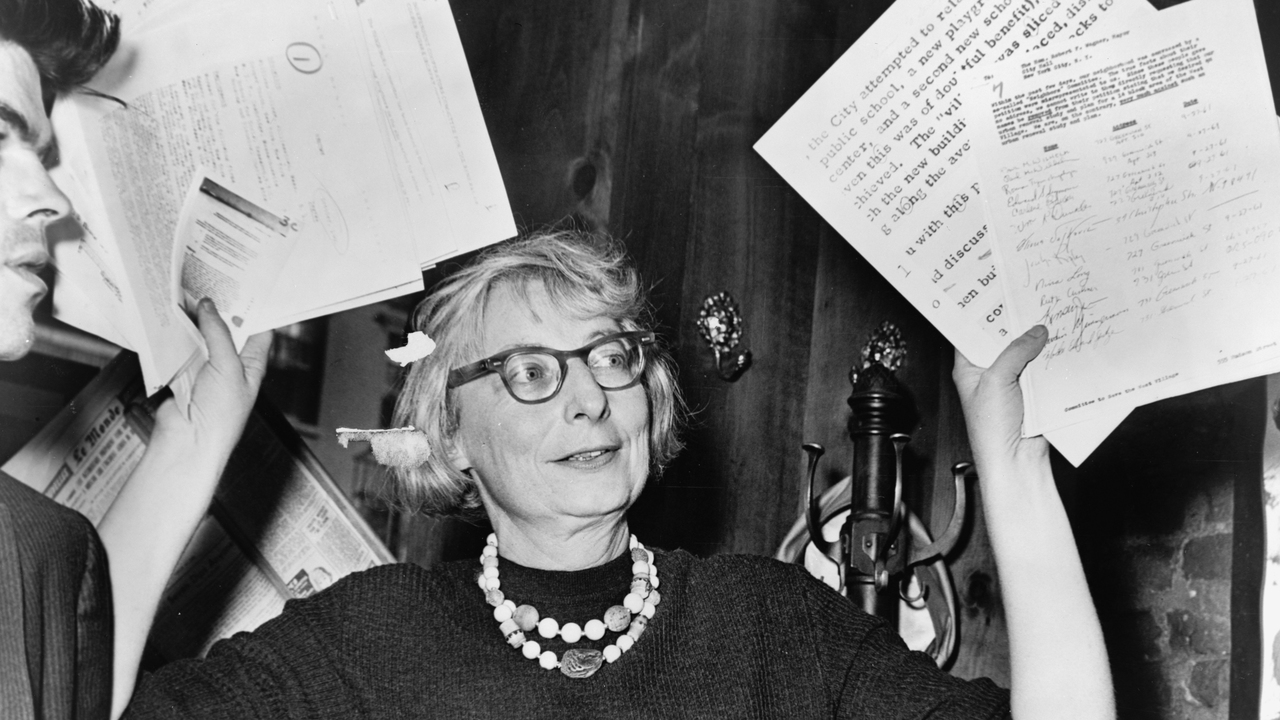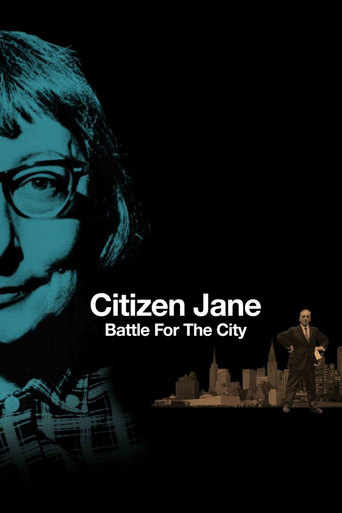

just watch it!
... View MoreHighly Overrated But Still Good
... View MoreThe best films of this genre always show a path and provide a takeaway for being a better person.
... View MoreA terrific literary drama and character piece that shows how the process of creating art can be seen differently by those doing it and those looking at it from the outside.
... View More10/26/17. Being a native New Yorker I enjoyed the nostalgic footage of the '60s and '70s. I had no idea of how urban development and urban renewal was going to destroy the fabric of what made up New York. So, it was good to hear about people such as Jacobs. What most people probably never knew was that they were going to tear down Grand Central Station. YES, the iconic Grand Central Station had not Jackie O stepped in and saved it. So, NYC owed its heart not to the builders of skyscrapers but those who felt that NY was more than just lifeless concrete and glass structures.
... View MoreThis is less a film more a hagiography. It makes accusations which may indeed have some merit but does nothing to try to challenge them.For example racial removal is cited as a reason for slum clearance but there is no counter to express the fact many project are what kept black communities from being erased by gentrification.Again Pruitt Igoe is cited that it was designed by a team that was made of of far more minority ethic architects than was usual at the time countering the remote whiteman image the documentary likes to play too. It ignores as is that racial segregation was forced upon the the plan and the rather important fact that black tenants where forced to move into the block when it was unfinished with some apartments lacking even plumbing.However the biggest flaw is looking at what happened to the neighborhood post demolition and what happened to the nearby neighborhoods that where not redeveloped and why the lives of the citizens have got so much worst since the development was demolished.Its is on the whole a very middle class view of city life, the projects are dismissed as bad most one suspects because the are not the demise of the middle class but doesn't look to see if anyone has anything nice to say about the project that cannot be all bad is the culture they have spawned from Hip-Hop to wave after wave of fantastic black film directors who produce the kind of films Hollywood can only dream of. While obviously Hip-Hop and a few good films don't mean the project are therefore a utopian dream they do at least prove that nor are they the social void Jacobs would have you believe.The biggest flaw however is what it fails to do is look for an example where knowingly or not, Jane Jacobs advice has in essences been how that city has developed. Their are of course plenty of examples that have been far closer to the Jane Jacobs model such as Paris which has a city centre that is a upper middle class ghetto or indeed London where some districts have lost all their life not through redevelopment by preservation and flows of capital and property investment for people who leave the places mostly vacant leaving immaculate ghost towns. One of the most tragic developments in our modern times has been the slow death of the city of Venice which has declined from one of the worlds great bustling hubs to an open air museum. Maybe if Robert Moses had been hired to build a highway down the gran canal and concrete tower blocks jutting out the lagoon the place would have a bit more life and a few less tourists today.It also fails to look at the cities in China it moans about and one wonders if anyone involved has ever been. Are they really soulless? In my experience the city of Hong Kong mile after mile of high-rises and shopping malls is one of the most trilling places on earth and yet the very similar building typography in Singapore provoked in me only boredom. its true as stated it people that make cities not buildings yet, the most striking think about both this film and indeed the Death and Life of the Great American City is while they talk about how much buildings should be people focused, that's all they do. Its a mantra that isn't really explored in anymore depth than the humanism of Le Corbusier and his beautifully drawn stick men.All in all this film is just one generation of urban thinkers giving itself a nice pat on the back at the expense of the previous.
... View MoreJane Jacobs and the successful battle to oppose Robert Moses' planned lower Manhattan expressway in the 1960s is the focus of this doc, but the film also raises general questions about the overreach of city planners who are too quick to tear buildings down and not very wise about the new buildings and highways that go in their place.It's a huge topic, so it was wise to focus here on Manhattan, where enough forms of political greed and poor planning took place to document the folly that went into projects that were completed, like the Cross-Bronx Expressway, along with some that weren't, like the prospect of bringing urban renewal to the West Village.Lots of footage Moses, Jacobs, and the wrecking ball and we'll put together from beginning to end.
... View MoreI do not think this film did justice to the rich subject matter the filmmakers tackled. It was very vague and repetitive, with the same shots of buildings being torn down over and over again, and the same lines being repeated by the narrator several times over. Similarly vague lines are quoted from Jacobs' book. Unfortunately the parts they chose that were specific, such as the need to have 'eyes on the street' at all times of day, are not as relevant in the modern day, as there are so many forms of entertainment that people are not likely to sit on their porch or at their window looking out onto the street, even if it is active. They are more likely lying in bed writing a review on IMDb or watching Netflix. However, most of the exposition of Jacobs' ideas don't even rise to that level of specificity. As a result, the viewer barely knows more about Jane Jacobs' criticisms walking out of the movie than going in. The source of Robert Moses' power wasn't explained. Part of the film contains a smug attack on Le Corbusier only to correct itself latter when they said his ideas were misrepresented. They try to jawbone some feminism at moments but never really pursue the idea. The film gives the impression Jacobs won (in America, at least), but ignores that high rise apartments and condos are as popular as ever. The lively "street" that Jacobs defended is not present in these new developments. Communities have migrated online. So did Le Corb win in the end after all?Given the high reviews this received, I expected better. It did show Jacobs' beginnings as a journalist. And there were a few interesting clips of Moses justifying himself. The note he wrote after reading Death and Life was interesting. It shows he did in fact read the book. However, both her and Moses deserve a better documentary.
... View More